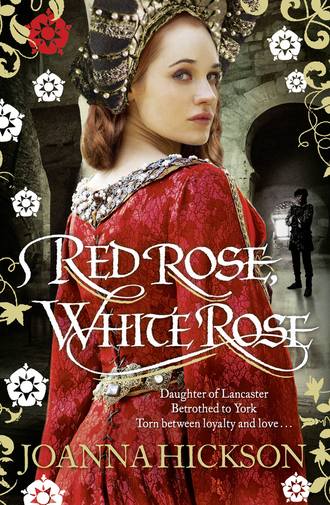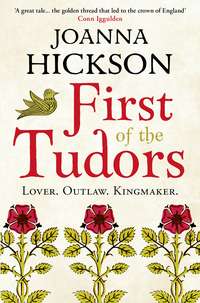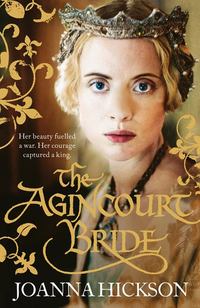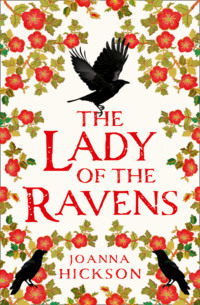
Полная версия
Red Rose, White Rose
When I eventually spotted the tower, poking up like a lone tooth from a fetid maw of flat, moss-covered marsh, I faced the problem of approaching it without either being seen or swallowed in its mire. There was something truly ghastly about the way the moonlight glinted off the surrounding expanse of innocent-looking moss and reeds, concealing the lurking presence of a bottomless bog beneath; when I tried to urge him on, my horse snorted and danced on the spot, flatly refusing to take one step onto such unstable ground.
Common sense told me there had to be a safe path or else how did its inhabitants reach the tower? For nearly an hour I rode around the edge of the morass, trusting my horse’s instinct not to venture onto dangerous terrain, but I could find no evidence of a marked route. I contemplated leaving my horse and trying to navigate the bog on foot but as the moon dropped in the heavens I realized I would be taking a foolish and possibly fatal risk, particularly in the dark. There was no option but to wait until sunrise.
As a squire I had spent months with the marcher scouts, a troop of hard-bitten, border-reared fighting men recruited for their intimate knowledge of the wild lands between Scotland and England and their ability to move secretly through them on their dale-trotter ponies. They could survive for weeks patrolling their section of the march, living off the land and avoiding human contact whilst observing all movement of men and animals without detection. I admired their skills and I would now apply all I had learned of them. I hobbled my horse in an overgrown spinney. My stomach made sharp protest at its lack of nourishment but I silenced it with a long swig from the wineskin slung from my saddle, rolled myself in my campaign blanket and lay down to gather what sleep I could in the undergrowth.
The unmistakable sound of a hue and cry roused me a couple of hours later. Shouting, the long wail of a hunting horn and the answering sounding of hounds ripped through the veil of sleep and jerked me to my feet, sleeve dagger at the ready. Dawn had mottled the eastern sky in shades of red, pink and grey and my horse’s head was up, ears pricked. I crept to the edge of the spinney for a cautious search but could see no movement from the section of bog within my view. Nevertheless the sinister sounding of horn and hounds and the shouts of men in pursuit were loud to my left. I decided that being mounted would give me an advantage in a tight situation, and better visibility. In a matter of moments I had tacked up my horse and was heading out of the spinney.
The reason for all the noise quickly became evident: a mud-streaked figure was struggling at the edge of the bog, only yards from firm ground but caught thigh deep in wet mud and unable to reach safety. It was Cicely, almost unrecognizable, covered in mud, exhausted and clearly terrified, her face twisted into a desperate snarl as she rocked herself to free one foot or the other from the clinging ooze. The hue and cry was close by, any moment it would be here and what I assumed was a break for freedom would be brought to an end, or, more terribly, she would fall flat into the watery mud and disappear beneath its surface.
‘Do not move!’ I shouted, spurring my horse forward and galloping as near to her as the horse would go. ‘It is me, Cuthbert. I will get you out. Wait.’
I jumped from the saddle, commanded my horse to stand and ripped my blanket from the restraint of its buckling.
‘Oh, Cuddy, thank God it is you!’ Cicely’s eyes were enormous with fright in her mud-daubed face. ‘Quick! The dogs are coming.’
‘Yes, Cis, I can hear them.’ Turning briefly, I caught sight of a man on the path pushing sticks into the ground as a companion behind him hauled on the taut leashes of two scent-hounds in full voice. I took aim and threw out the blanket. ‘Here, catch this.’
One corner landed near her hand and she grabbed it like a drowning sailor might grab a life-line. ‘Do not let go, Cis! Lie down, I’m going to pull you out,’ I said urgently.
The Cicely I knew might have quibbled at falling face down in a bog but luckily she wasted no time in clutching two sides of the blanket in a white-knuckled grip and throwing herself horizontal, face down in the soggy blanket. Immediately there was less suction drag on the cloth and I managed to haul her swiftly towards me until I could hold her hands and heave her, drenched and panting, onto the firm ground.
I could see she was about to speak and I growled at her. ‘Save your breath, Cis. I have a horse and we will ride away from this first.’
Although her weight was nothing to arms honed by years of sword-play and archery, her soaked skirts hampered my stride so that I stumbled rather than ran towards my stoical horse who fortunately obeyed orders and stood firm, even as I threw Cicely face down over his withers and leaped up behind her. ‘Hang on for your life. I’ll stop as soon as I can,’ I yelled and dug in my spurs.
He exploded away just as the first pursuers stepped onto firm ground and began racing towards us, scent-hounds baying with excitement. Cicely’s right hand closed on my leg like a vice as our hectic pace threatened to hurl her from the horse’s neck. I am not certain we would have made it but instinctively the courser threw up his head, tossing her back towards me so that I could wrap one hand in the cloth of her skirt, while the other handled the reins. She must have been winded and in pain but she made no sound and we galloped away as if fleeing from a battlefield, the important difference being that we were victorious. The only glance I managed to make behind me showed a dozen mud-spattered men spilling from the bog-path yelling in frustration. One was noticeable for his red tunic emblazoned with a white saltire cross and his shock of fair hair. The tall figure of Sir John Neville was familiar to me from sharing duties with him on the Scottish march. White-faced and wide-eyed, he looked like a man in shock.
9
The Raby Bath House
Cicely
Cuddy rode away from that accursed bog as if the hounds of hell were at his heels while I pitched and bumped over his horse’s neck, offering desperate but silent prayers to the Queen of Heaven. I had no breath even to murmur an Ave, every thud of the horse’s hooves seemed to force out what little air I managed to drag into my lungs and every so often I had somehow to raise my head for a life-giving gulp. Fortunately, just as I had started to fear I could hold on no longer, the pace began slowing and we came to a halt. When I fell to the ground my legs would not support me and I crumpled in a muddy, sodden heap under the horse’s feet, a safe landing place because he could not move another step. His head hung down and his sides heaved. We were both gasping like stranded fish.
It was several minutes before I found the strength to sit up. By then Cuddy had dismounted and satisfied himself that there was no sound of pursuit before pulling me out from under the horse and unhitching his wineskin from the saddle-bow. He put it to my lips and I spluttered as the sharp liquid hit my throat.
‘How did … you know … where …?’ I croaked, unable to go on.
Cuddy knew what I meant. ‘Intuition. Instinct. Second sense. Your mother sent me on a wild goose chase and look – I found the goose.’ He grinned. ‘After all, I am your champion.’
I gave a weak smile and wheezed, ‘My champion …’ My voice cracked and failed once more.
He bowed. He did not seem breathless in the least. ‘Glad to be of service. But you take the laurel wreath, Cis. How in God’s name did you manage to break out of the tower?’
That was when reality hit me. Vivid memories came flooding back. I bit my lip to stop the tears and stifle the words threatening to spill off my tongue. I knew then that they would all ask the same question. How had I managed to get away from my captors? It was a question I decided there and then that I would not answer. Let them wonder. Except for Cuddy they had done nothing to help me. I did not owe an explanation. But had it not been for Cuddy, everything I had done to enable my escape would have been for nothing. I might as well have died.
I shook my head and decided it was easier to speak in short bursts. ‘Not difficult. Bog was the problem. Frightening. Then I heard the horn. Tried to hurry. Fatal step – if not for you. Thank you, Cuddy.’
Gradually I felt strength returning to my legs. ‘There is one more thing you can do for me, if you will,’ I said, taking another gulp from the wineskin and handing it back. ‘After you have helped me up, that is.’
I held out my hand and Cuddy pulled me gently to my feet. I swayed and staggered and he steadied me, regarding me appraisingly, his gaze travelling from my sodden skirts to my dripping locks. I had not found my hat in the dark and I daresay my cheeks were streaked, for I had not managed to hold back all my tears. ‘I think I know what that one thing is,’ he said.
‘More intuition?’ This time my smile was rueful.
‘You do not want to return to Raby looking like a camp follower who has been caught in a thunderstorm.’
I nodded. ‘Exactly.’ For the first time I glanced around me, taking stock of our surroundings. We were in a small clearing among mature trees. It could have been almost any wood in England. ‘Where are we?’
‘Houghton Forest. About ten miles from Raby. It will take us an hour to get there once the horse is rested. There is a stream over yonder. You could wash off some of the mud while we wait. When we get to Raby you can hide somewhere safe and I will fetch Hilda. She will know what to bring to restore you to your customary splendour.’
He was teasing, his eyes twinkling, trying to lighten my mood, and I appreciated his restraint in not pressing me on my escape. Cuddy may have been conceived in a barn but his manners were castle-bred. ‘And Hilda knows how to hold her tongue,’ I said with a nod of approval. ‘But where would I be safe?’
‘There is an old bath house on a lake in the woods south of the castle. You can barricade yourself in there while I fetch Hilda. No one goes near it now but they say our father used to entertain there in days gone by.’ Cuddy gave me a look, which told me not to enquire about who the old earl had invited to a bath house in the woods or what the entertainment had been. Of course there were plenty of rumours, but in deference to my mother nobody ever talked about other ‘by-blows’ her husband might have sired on pretty girls around the various Neville territories. No others had joined the household. For some reason, in our father’s eyes, Cuthbert of Middleham had been special. Perhaps Cuddy himself did not know why.
The bath house was no woodland shack. It was a domed, stone-built grotto perched on the side of a glassy mere which reflected a stand of magnificent trees that must have been planted when our great-grandfather enclosed the Raby hunting park a hundred years earlier. Although the trees were still leafless, waiting for spring to spread its canopy of green, the castle itself was not visible, but I knew it was not far away because in order to reach the place unseen we had skirted the village of Staindrop and entered the park like poachers, avoiding all well-used tracks. Staindrop stood only a mile from Raby; my father lay in its glorious collegiate church, under a marble tomb, beside his first wife. Cuthbert forced his way into the bath house through a wooden door, not locked or barred but swollen from winter damp, and left me with the wineskin, telling me he would be back within an hour.
The bath house consisted of a single chamber. Stripped of any of the luxury or comforts it might once have contained, cobwebs festooned its walls, all hung about with insect carapaces; droppings of various small animals littered the floor and the curved steps that led up to the parapet of the round stone bath and, at the bottom of the bath, the remains of a deserted nest covered what I guessed must have been a drain for emptying the water into the lake. Outside, on the bank of the mere, I found a firepit where a cauldron would have been slung over the flames. My imagination conjured up a vivid image of servants fetching steaming bucket-loads from the cauldron, because surely nothing would have cooled the ardour of the ‘bathers’ more than icy water straight from the lake.
I could not wait in the bath house. It was full of echoes, the ribald shouts of men and the lusty laughter of women, the splash of water on naked flesh, and I did not like it. My father had always been my image of the perfect knight, lord and sire. In recent days that gleaming icon had become tarnished by the stories I had heard and the truths I had learned.
The silence and stillness of the mere drew me. I guarded against discovery by taking up a position a few yards from the bath house, hidden by the branches of a holly tree growing close to the edge of the lake. There I sat on a convenient log and I studied my reflection in the glassy surface of the lake. What I saw absorbed and disturbed me. It was not that my hair was tangled in Medusa-like curls and my face was still mud-streaked, despite my efforts to wash it: I was not the same person who had set out blithely from Raby with her falcon three days before. Then I had been thoughtless and carefree, a young girl on the brink of marriage but who had given little thought to what that marriage might mean. My life had been ordered for me and while I had occasionally rebelled against the restrictions placed on me, I had not seriously questioned my own feelings or considered my own future. I had scarcely known I had any of my own feelings. Now there was a new look in the wide blue eyes that stared back at me and a more determined set to the curved mouth which did not smile. There were secrets behind those eyes; thoughts and words which those lips had spoken but would never speak again. The child who had gone out hunting had come back an adult.
10
Raby Castle
Cicely
‘Sweet Mother of God, he brings a whole army! Does he intend to wed or make war?’
It was Will who spoke. I stood between him and Ned on the battlements of Clifford’s Tower, the tallest at Raby, staring out through a crenel at the long procession snaking down from the Auckland road towards the castle gatehouse, the far end of which was not yet visible. Richard, Duke of York, was arriving at last and he rode at the head of an enormous retinue and baggage train.
‘Does he think he is the king?’ Ned cried. ‘There must be three hundred retainers. Can we feed so many?’
‘We will have to hunt more game, brother. That should be no hardship.’
‘I am not sure the park contains enough deer.’
Viewing my betrothed’s enormous train, I felt a mixture of awe and bewilderment. ‘Why does he need such a vast retinue?’ I asked. ‘Has there been unrest in the realm?’
Will laughed. ‘It is not a case of need, Cis. Richard is declaring to the world “I am the Duke of York. See how many follow me. Behold my wealth and power.” Brother Hal will be a little disconcerted. His Salisbury retinue numbers only two hundred.’ Ned turned and headed for the tower stair, adding, ‘He will be at the gatehouse soon and we are detailed to escort him in.’
They were both gone. It was Maundy Thursday. Tomorrow the whole castle would plunge into the solemn fasting and ritual of the Unveiling of the Cross before bursting into full celebration of the Resurrection on Easter Day with joyous feasting and minstrelsy. Two days after that would be my wedding to this rich and powerful new duke – the grandest nuptials ever to be celebrated within the walls of Raby castle. I lingered a little longer, mesmerized by the spectacle of the cavalcade approaching ever closer.
A trumpet blast sounded a fanfare of welcome. Next, Westmorland Herald recited the list of honours and titles in a high, penetrating voice that carried all around the outer bailey – ‘Richard Plantagenet, Duke of York, Earl of Cambridge, Earl of March, Earl of Ulster, Baron Mortimer, Lord of Wigmore and Lord of Clare’ – and my future husband. He rode in full armour and trappings, an upright, broad-shouldered man. Behind him rode his escort of retained barons and knights, all proudly in formation displaying the blue and murrey-red livery of York. White rose pennants fluttered at their lance-tips, fixed between their own individual pennants and the scarlet, gold and blue of the royal leopards and lilies, to which Richard was entitled as a royal prince and direct descendent of King Edward the Third. Behind each of three barons and twelve knight-captains, rode their troops of squires and men-at-arms and behind them the household officials, couriers, clerks and house-carls, huntsmen and falconers with their hounds and hawks and a procession of wagons containing clothing, furnishings, provender and presents.
Anyone would have marvelled at what I saw, but I was remembering the under-age lordling who had set out from Raby seven years previously to take service in the king’s household. I could scarcely believe my eyes. Then he had been a scrawny lad of fourteen, spotty and insecure, an orphan who had fought hard to establish himself among the numerous squabbling henchmen and progeny of his Neville guardians. Now he was twenty-one, the wealthiest magnate in the kingdom, who carried his head so high it seemed to add inches to his stature. Immediately behind him rode a squire bearing his crested helmet and richly emblazoned shield. No wonder Ned had compared him to a king.
By the time the principal members of the procession had passed through the gatehouse, I had descended from the keep to the inner ward where my mother and brothers were already gathered to greet the new arrival. The clatter of hooves on the flagstones of the long Neville tunnel-gateway, built by my father to secure the castle’s inner core, gave us warning of the duke’s approach and, to the muttered reproof and intense relief of my mother, I slid into place beside her just in time. As the king’s aunt, she was the only one who outranked Richard and as soon as he had swung down from his horse he strode up to bend his knee to her, a deference which gave me a chance to assess this bridegroom of mine before he scrutinized me. Seven years at court, three of them in France; how greatly altered was the boy to whom I had been betrothed at the age of nine.
Close to I saw that he was good-looking without being naturally handsome. His complexion was fair, his cheeks smooth-shaven and his hair, the colour of dark honey, was thick, curly and shining. Expert grooming, good posture and extreme fitness had given him a chiselled profile and the gleaming and costly silk of the crested jupon he wore over his armour was embellished with bold and intricate embroidery depicting the royal arms quartered with those of his Mortimer mother and his Castilian grandmother. My first impression was of an ambitious man who sought perfection in everything. I wondered if he would find it in me. The only feature that softened this image was that luxurious mane of burnished hair in which, suddenly and to my guilty surprise, my fingers itched to bury themselves.
Before I could banish this sinful thought to the dark recesses of my mind, my betrothed was moving to greet me, his eyes fastening so intently on mine that I felt sure he must be able to read it through their window. Consequently, to my chagrin, I blushed.
‘My lady Cicely, my duchess,’ he murmured and he squeezed my hand gently as he lifted it to his lips. His attitude was so charming and assured that I could find no similarity with the awkward, gawky youth who had slipped the betrothal ring on my finger and I quashed any comparison with Sir John Neville of Brancepeth. He was no longer to exist for me. The man who kissed my hand was my destiny, the future that was mapped out for me. Since my return to Raby I had prayed fervently for the strength and grace to embrace that future and fulfil the role expected of me. I lifted my head and felt the blush recede. To my relief I could see admiration in the flecked green eyes which studied me so intently.
My mother had insisted on an intimate talk with me on the day following my return. She had banished all family, companions and servants from her salon and settled us both in cushioned chairs near the hearth. I had expected this and after a much-needed bath, a hot meal and a good night’s sleep, I felt confident that I could handle my mother’s inevitable probing about my time as a hostage. I managed to avoid lying to her by concentrating on the fraught circumstances of my escape and Cuthbert’s rescue and avoiding too much mention of my companions at Aycliffe Peel. Fortunately she was more interested in my encounters with Lord and Lady Westmorland, exclaiming indignantly over Lady Elizabeth’s unkindness and Lord Ralph’s unreasonable demands. I think she was so relieved that I had returned in time for Richard’s imminent arrival and by so doing also avoided the necessity of her having to make any concessions over property that she neglected to ask any direct questions about Sir John Neville.
On the night of Richard’s arrival, it being Maundy Thursday, there was a discreet and private meal in the Great Chamber behind the Baron’s Hall, attended only by family members, visiting clergy and the principal York retainers. Only one course was served, consisting of fewer than twenty meatless dishes and accompanied by light Anjou wines and Spanish sack. When a single subtlety was paraded towards the end of the repast, Richard was delighted to recognize a gilded marchpane model of his own personal emblem, a falcon perched on a fetterlock, a special type of padlock used to secure valuable horses against theft.
‘I compliment your cooks, my lady,’ the duke said to his hostess. ‘I only registered my personal badge with the Royal Heralds quite recently. I am surprised anyone so far north knew of it.’
My mother frowned. ‘We are not completely out of touch at Raby, my lord duke, and my cooks have plans to conjure even more imaginative ways of celebrating your marriage feast on Tuesday, which I believe is also your saint’s day.’
‘Yes, the feast of Richard of Chichester – a truly English saint. I shall look forward to those. But Raby has already conjured me a wondrous bride. What more could I ask?’
This gallant response had me blushing again, despite my desire to appear mature and controlled, and my mother made no secret of her delight at her future son-in-law’s honeyed words. The frown disappeared and her sapphire eyes sparkled. Richard’s time at court had certainly taught him how to charm the ladies and I could see that my brother Hal, not usually easily pleased, was more than a little impressed by the urbane and sophisticated nobleman that had developed from the diffident young squire who had left Raby soon after our father’s death. By contrast I was beginning to feel gauche and insecure, not a sensation I enjoyed.
This sense of inadequacy was compounded by Hal’s remarks to me later as we said goodnight. ‘You will have a great responsibility as Duchess of York, Cicely. Richard gives every sign of becoming a force in the land and not only thanks to his birth. He is a man of fierce ambition which will need tempering and a good wife should be the one to put a curb on his pride. Otherwise what now appears to be admirable intent could end up looking like arrogance and he will make enemies. Your role will need great patience and subtlety. I hope you have these qualities.’
I frowned, surprised by his sensitivity. ‘I thought that all a great lord wants from his wife is sons, Hal. And that is in God’s hands surely.’
He shook his head. ‘You are wrong. Believe me, my wife Alice has brought far more than three sons to our marriage. She has become my most valued confidante and adviser. Only she knows the true workings of my mind and gives me her sincere view of its direction. You can be of similar value to Richard if you cause him to respect your opinions.’ He gave me one of his rare smiles. ‘And a few sons would not go amiss as well, of course.’
I gazed at him with innocent enquiry. ‘And I suppose the earldom of Salisbury which Alice brought you has nothing to do with the regard you have for her?’






